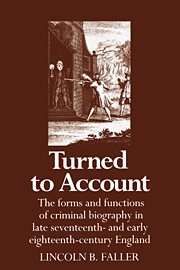 Turned to Account
Turned to Account Book contents
- Frontmatter
- Contents
- Preface
- Part I Turning criminals to account: three case histories and two myths of crime
- Part II Enucleating the truth: the criminal as sinner turned saint
- Part III Palliating his crimes: the thief as various rogues
- Postscript: Criminal biography and the novel
- Appendix I Who read the popular literature of crime?
- Appendix II The politics of thieving
- Notes
- Select bibliography
- Index
Appendix I - Who read the popular literature of crime?
Published online by Cambridge University Press: 05 February 2012
- Frontmatter
- Contents
- Preface
- Part I Turning criminals to account: three case histories and two myths of crime
- Part II Enucleating the truth: the criminal as sinner turned saint
- Part III Palliating his crimes: the thief as various rogues
- Postscript: Criminal biography and the novel
- Appendix I Who read the popular literature of crime?
- Appendix II The politics of thieving
- Notes
- Select bibliography
- Index
Summary
“The Lives and infamous Actions of the most profligate Criminals have met with a Reception from Persons of all Ranks and Conditions,” claims the author of The Life of Waller ([1732], p. iii), which sounds like Pope's claim that The Beggar's Opera “hit all tastes and degrees of men, from those of the highest Quality to the very Rabble” (The Dunciad [1729], 3:326 n.). Such contentions get absurdly echoed in Anecdotes of the Most Remarkable Highwaymen (1797): “although the utility of this Work is absolutely without limitation,” its compiler declares, “the following Classes are particularly interested in the Lives and Anecdotes which we have recorded:–Magistrates, Bankers, Merchants, Tradesmen, Country Gentlemen, Company at Watering Places, Foreigners, Masters and Mistresses of Lodging-Houses, Lawyers, Publicans, Keepers of Prisons, Bailiffs, Stewards, Clerks, Shopmen, Youth of both Sexes, Female Housekeepers, Doating Old Maids, Husbands and Wives, Lovers, Peasants, &c. &c. &c.” (p. vii). Certain kinds of writing about criminals nonetheless seem to have been class-specific, or so it appeared to contemporary observers. Thus the author of The History of John Sheppard (1724a) links ballads and broadsides to “the common People” and “the vulgar,” apparently aiming his own, longer, more sophisticated text at “Citizens” and those of “tolerable Fashion” (pp. 148, 153, 164). The dedication of Compleat Tryals (1718, 1721) to the lord mayor and aldermen of London, along with the recorder and sheriffs of the city, also indicates an effort to attract a bourgeois audience, as does the dedication of The Malefactor's Register (1779) to Sir John Fielding.
- Type
- Chapter
- Information
- Turned to AccountThe Forms and Functions of Criminal Biography in Late Seventeenth- and Early Eighteenth-Century England, pp. 203 - 208Publisher: Cambridge University PressPrint publication year: 1987
- 2
- Cited by
